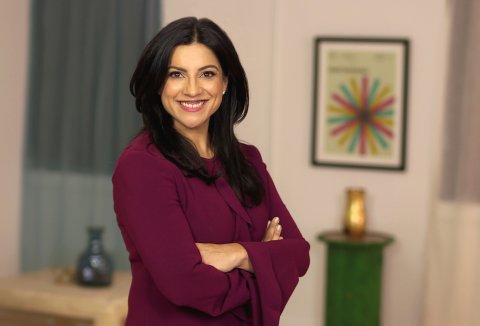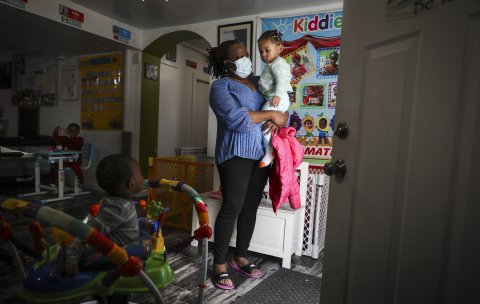
Advocates for working women have much to applaud this week, between the imminent passage of an expanded tax credit for families with children and the establishment of a Gender Policy Council by President Joe Biden to help advance equity for women across a wide range of issues. For Girls Who Code CEO Reshma Saujani, though, the legislation in Congress, while "a huge victory," is just "a down payment" on the sweeping changes needed to reverse the damage the pandemic has inflicted on working women.
And Saujani believes she has just the fix needed: the Marshall Plan for Moms.

The proposal, named after the signature post-World War II program that saw the U.S. provide more than $12 billion in economic assistance to rebuild Western Europe, is designed to help working mothers rebuild their lives and careers after the havoc wrought by the pandemic. That's included a rapid exodus of women from the workforce, driven by job loss that has disproportionately hit the industries they dominate and by many feeling forced to leave or scale back their roles because of school closures and lack of childcare.
"COVID-19 has decimated so many of our careers," Saujani wrote in an opinion piece for The Hill last December that helped launch the initiative. "Two million of us have left the workforce, at a rate of four times that of men in September alone. Millions more have been forced to cut back our hours or work around the clock to keep our jobs and be full-time caregivers. This is not an isolated incident—it is a national crisis."
A central feature of the plan, and the one that's prompted the most controversy, is a call to provide short-term monthly payments of $2,400 a month to moms in need. Other asks include paid family leave, affordable childcare, pay equity, retraining programs to ensure women can fill the jobs that exist and a plan to safely reopen schools five days a week.
The proposal was made in a full page ad in The New York Times this January, addressed to Biden. "You didn't create this problem," the ad said, "but your administration has an opportunity to fix it."
Lots of boldface names in business, entertainment and sports have expressed support, including more than 50 women who signed the Times ad. Among them: Ellevest CEO Sallie Krawcheck, comedian Amy Schumer, actors Eva Longoria, Julianne Moore and Charlize Theron, Rent the Runway CEO Jennifer Hyman and #MeToo founder Tarana Burke. Prominent male signatories followed last month in a full-page as in the Washington Post, including basketball player Steph Curry, actors Don Cheadle and Colin Farrell, organizational psychologist Adam Grant, Craigslist founder Craig Newmark and New York City mayoral candidate Andrew Yang.
Not everyone is on board though. Critics include some advocates for working women who share the goal but not the method. A common theme, voiced by Samantha Ettus and Amy Nelson, of the podcast What's Her Story With Sam & Amy, in an opinion piece for Newsweek: "An economic recovery plan to pay for mothering, which might have been a suitable idea in 1950, has no place in 2021...Paying women—and only women—for raising kids and running a home is precisely the wrong way to show a woman her worth and address gender inequity."
Saujani is unfazed. The daughter of immigrants who came to the U.S. from Uganda after the regime of Idi Amin expelled people of Indian descent in the early 1970s, the former lawyer is used to dealing with criticism after having run twice, unsuccessfully, for office in New York City. Via Girls Who Code, she's also successfully pushed for legislative action before, helping to pass state laws that track gender diversity in computing.
Newsweek spoke with Saujani about the Marshall Plan for Moms, how she answers critics, her personal pandemic challenges and what's next. The conversation has been edited for space and clarity.
What inspired you to create the Marshall Plan for Moms?
We're in a national crisis [as a result of the pandemic] and women's labor market participation is back where it was in the 1980s. It took just nine months to lose 30 years of progress.
As the CEO of Girls Who Code, I've spent the last few years inspiring my girls to be changemakers, telling them that they can be anything. Now so many of them are watching their mothers become exhausted as schools close and [those moms] become teachers, nannies, tech support, cooks, all while they are working full-time jobs. We need a 360 plan to get moms back to work.
A central aspect of your plan is providing $2,400-a-month support payments for moms, means tested. How did you land on that amount?
We based it on the $600-a-week federal unemployment checks that were [passed in the first stimulus package]. That's a good starting point for conversation. Part of getting moms back to work is putting cash in their hands. What's wild is that the Democrats have since introduced something similar to what we are proposing. [A one-year expansion of the Child Tax Credit, which would result in families receiving up to $300 a month per child, is part of Biden's $1.9 trillion COVID-19 relief package.] My number is much bigger, but one of the things that President Obama will say today is that, when we were in a recession in 2008, the administration didn't think big enough.
Why has this become a big issue for you?
So much of the progress we have fought for [as women] is at risk. [I am] the daughter of refugees; my parents came to this country with $10 in their pockets and lifted themselves up into the middle class [but] I was a latchkey kid. My parents couldn't afford childcare. I often thought about my mother as I was living this pandemic nightmare with a lot more support than she had, and about what she would have done.
Half the girls we teach at Girls Who Code are on the poverty line, half the girls are black and lantinx, and [I think a lot about] the pain that their families are going through right now. The choices that many women are having to make [about balancing their family's needs and work responsibilities] are really not choices. We're feeling that pain personally and as a community and wanted to do something about it.
The Marshall Plan for Moms also includes a call to action on parental leave, affordable childcare and pay equity. Why are these changes also necessary?
We had a childcare crisis before COVID-19, but the uncertainty of schools has exacerbated it. Women can't work unless they have a support structure that includes affordable day care and paid leave. We are one of the few countries that doesn't have paid leave.
You've acknowledged that this plan "will not solve the deeply rooted norms that make women our default caregivers." What do you hope it will do?
We're drawing attention to the reality of so many women. You can't rebuild America back better unless you build motherhood back better. If you look at legislators and leaders that are making policy decisions, it is still largely men. If you think of the lack of government support provided to women and moms during the COVID-19 crisis, it is clear that valuing mothers' labor isn't a priority for our leaders.

You spoke with the Biden Administration about the Marshall Plan for Moms last month. Were there any specific next steps to come out of this meeting?
We spoke to Carissa [Smith], who runs Constituency Outreach, about the importance of mothers and caregiving and the issues that we raised [in the plan]. The focus now is on Congress. A lot of the things we're talking about are in the Biden relief bill. The expanded Child Tax credit is essentially a down payment on the Marshall Plan for Moms.
Has anyone in government stepped up to propose legislation along the lines suggested in the Marshall Plan for Mom?
Yes, Grace Meng, [a Democratic representative from New York], introduced a bill, House Resolution 121, calling for a Marshall Plan for Moms that has over 25 co-sponsors in February. It's important validation. We're going to try to introduce that resolution in lots of different states. [Note: Meng's bill does not call for a $2,400 monthly payment to mothers but does include provisions for expanding paid leave policies, expanding the child tax credit and earned income tax credit, a $15 federal minimum wage and mental health support for moms. It has been referred to several House committees where it awaits further action.]
As someone who once ran for office, what odds of passing do you give this proposal?
We have two years, [until the midterm elections], to get it done and I'm going to do everything I can to make sure we pass paid leave, affordable daycare and that we get women's recovery back to where it was when COVID-19 started. We were the majority of the workforce and that should be our goal.
There has been criticism of the Marshall Plan idea from advocates who worry that singling out moms instead of all parents will actually set working women back.
I got the same kind of criticism when I started Girls Who Code. So many people said, why girls? Shouldn't all kids learn how to code?
The reality is if I had started Kids Who Code instead of Girls Who Code, it wouldn't have acknowledged that we have this enormous gender gap in tech and I wouldn't have been able to design a solution targeted at getting girls to learn. And we wouldn't be here nine years later with 300,000 girls coding, shifting the cultural conversation on girls in STEM.
But for nine years anytime I'm doing an interview or doing a speech, one of the first questions asked, often by women, is: "What about my son?" And I get it, but, I think, we have to react to the world as it is and not as we want it to be.
Your plan has been criticized for excluding fathers, especially single dads, dads who are primary caregivers and those who are part of a gay couple. Your response?
When we argue for basic income payments, men benefit too. When we talk about affordable daycare, dads benefit too. When we talk about paid leave, dads benefit too.
All caregivers matter but not all caregivers are facing a penalty for being parents. Mothers do. Mothers face a motherhood penalty while fathers face the fatherhood premium. [Research has shown that women's earnings typically fall after having a child, while men's increase.] There is a difference between focus and exclusion. We're focused on moms because we've a history of not valuing moms and this issue right now is disproportionately affecting mothers. We need to name it otherwise we will never fix it.

Critics also say that paying only mothers for parenting and housework is an outdated idea and the wrong way to help women get what they're worth. What do you say?
The Marshall Plan for Moms is not a 1960's argument. It is a 2021 argument. We have to respond to the moment that we are in and what's happening now is what is reinforcing gender norms at home. It is preventing women from getting back to work and setting them back in their careers. I know it is the most controversial idea but the plan isn't just about paying moms. It is about parental leave, pay equity, accessible childcare too. If I had called it The Marshall Plan for Parents, people wouldn't have paid attention.
What's next? How will you continue to advance the Marshall Plan for Moms?
We have tens of thousands of people who've signed our petition and I think getting those people educated about how they can participate in this fight is really important. Also, now that we have this House Resolution bill, we can work on getting a similar resolution introduced in every state. That's the next thing we're figuring out how to do.
What else is going on with you? What's new and exciting about life at Girls Who Code?
Oh my god, so many new and exciting things. We've had to pivot a lot of our programs virtually, which has allowed us to teach more girls, more underserved girls, which I am really proud of. We're also continuing to work with companies to make sure we don't lose the gains we've made; 40 percent of our Girls Who Code alumni had internships or full-time offers reneged. Everybody working in the women and girls space is just trying to not lose the progress that they've made.
So many nonprofits have suffered during the pandemic. Have you seen a drop-off in donations or volunteers?
No, the organization is stronger than it's ever been and that's because we pivoted quickly. But I will say this was the toughest professional year of my life; I've never worked harder, fought harder, pushed harder to make that happen. I was terrified because so many organizations have suffered or shut down or closed.
How are you handling all this in the midst of a pandemic—helping your young son with remote schooling, running Girls Who Code and now advancing a major policy proposal?
It's a lot. When COVID-19 started, I found myself with a newborn baby, a five-year-old who I had to homeschool, running a global nonprofit that was on the brink because all of our girls were in classrooms that were closed and companies that were no longer working. I was working 16 hours a day trying to navigate everything. I think, like a lot of mothers in the beginning, I was just grinning and bearing it, but the uncertainty and inconsistency of school for me, and a lot of other moms, just became too much. We reached a point where I was just feeling incredibly overwhelmed and angry.
What have you discovered about yourself in the process?
With my first son, I saw him two hours a day. I was on planes and trains evangelizing about women and leadership all across the world. So my life dramatically changed [when the pandemic began.] Now I see my kids 24/7 and, to be honest, I'm definitely someone who is better when it is somewhere in the middle of those two.
I think a lot of my generation, too, married very progressive men who we thought were going to split [childcare and housework] 50/50 and then we realized, oh shoot, it is 70/30. So in between all that work, I am cooking, cleaning, ordering groceries, making doctor appointments, I'm trying to look after my elderly parents and get them COVID-19 vaccines—all while running one of the largest women and girls organizations in the world. Like most mothers in America, I'm angry, I'm tired and I don't feel seen, or valued, or appreciated.
Have you given up on running for office again?
I never say never. From the time I was a little girl, I always thought the best way I could serve was through political office. I ran twice, lost twice, so I don't know if that is in the cards for me.
Every year, I ask myself how I can best serve the people. I know this is going to sound cheesy, but, as the daughter of refugees, this country saved my parent's lives and I am deeply patriotic. For me, my Dharma is to serve a country that literally saved my life. Girls Who Code was all about service, service to girls who are like me, who had ideas but didn't have the resources or the money or the credentials. Similarly, now this issue [advocating for a Marshall Plan for Moms] is what I feel called to do in this moment.
As the first Indian-American and South Asian American woman to run for Congress, how do you feel about Kamala Harris being elected VP? Is it personal to you?
Oh my god, yes! I cried and cried and cried and cried! I would never have thought that Kamala Devi Harris, whose mom's name was Shyamala and who talks about her Aunties, would be vice president of the United States. It means everything to the community. I'm just so proud. We say you can't be what you can't see, in the words of Marian Wright Edelman. Now every Black, Brown, Asian and white girl can look at Kamala and say: "Ok, me too. I can do it."
About the writer
Kerri Anne Renzulli is personal finance journalist based in London; she's written for Money, Financial Planning magazine and CNBC.














